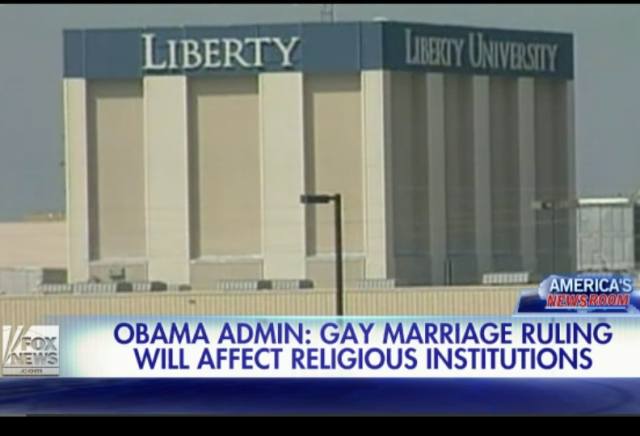The world of post-SCOTUS gay marriage and church insurance

Last week, we took a look at an insurance notification received by a church in Oregon. National Review’s David French originally reported the story.
Those fearful Obergefell v. Hodges could spell trouble for religious liberty were validated much sooner than anticipated.Less than 48 hours after the decision was handed down, New York Times columnist Mark Oppenheimer called for the end of tax exemptions for religious institutions.And the piecemeal dismemberment on religious liberties continues.Now infamous for their intolerance of Christianity, Oregon continues to be ground zero for the Biblical Principles vs. Ideological Fascism showdown.National Review’s David French explains an emerging problem for Oregonian pastors seeking liability insurance.
Churches, like virtually every functioning corporation, protect against liability risks and the potentially ruinous costs of litigation through liability insurance. With same-sex marriage now recognized as a constitutional right — and with news of Oregon’s Bureau of Labor and Industries awarding a lesbian couple $135,000 in damages for “emotional, mental and physical suffering” after a Christian bakery refused to bake their wedding cake — pastors are reaching out to insurance companies to make sure they’re covered. And at least one insurer has responded with a preemptory denial: no coverage if a church is sued for refusing to perform a same-sex wedding.
While denying insurance coverage is not itself an encroachment of religious liberty, lack of protection is as much a problem; one that could easily sink any independent church that winds up the defendant of a complaint.
French continues:
On July 1, David Karns, vice president of underwriting at Southern Mutual Church Insurance Company (which “serve[s] more than 8,400 churches”), wrote an “all states” agents’ bulletin addressing same-sex marriage. It begins: “We have received numerous calls and emails regarding the Supreme Court’s ruling on same-sex marriages. The main concern is whether or not liability coverage applies in the event a church gets sued for declining to perform a same-sex marriage.” Karns continues:
The general liability form does not provide any coverage for this type of situation, since there is no bodily injury, property damage, personal injury, or advertising injury. If a church is concerned about the possibility of a suit, we do offer Miscellaneous Legal Defense Coverage. This is not liability coverage, but rather expense reimbursement for defense costs. There is no coverage for any judgments against an insured.
In other words: Churches, you’re on your own. (National Review has tried to reach Mr. Karns and Southern Mutual’s corporate office, and they have not yet returned our calls.)
Monday one of our astute readers and blogger at Insureblog (a blog that covers all things insurance), provided a much appreciated technical view of the church insurance/religious liberty discussion.
Henry Stern writes:
SSM & Church Insurance
The other day, we looked at how health insurance (particularly group plans) will be impacted by the recent SCOTUS ruling on Same Sex Marriage (SSM). Now, the legal beagles over at Legal Insurrection have a very interesting post about the future of liability insurance in this new, enlightened age, and it’s not pretty:“On July 1, David Karns, vice president of underwriting at Southern Mutual Church Insurance Company (which “serve[s] more than 8,400 churches”), wrote … The main concern is whether or not liability coverage applies in the event a church gets sued for declining to perform a same-sex marriage”The short answer: No.As usual when it comes to issues involving Property and Casualty (P&C), I turned to good friend and guru Bill M for his insights:The reason that coverage in such circumstances would (likely) be declined is that it was an intentional act of violating the law. So if (when?) a church (or synagogue, or mosque) is sued for refusing to perform a SSM, the resulting lawsuit would not be covered. That also means the carrier has no “duty to defend” (basically: provide legal counsel).Of course, any fines imposed by the state would also be excluded.This is not quite the same as the linked post’s headline:“Churches refusing to perform same sex marriages may be denied liability insurance”At this point, no carrier is refusing to actually underwrite and issue a policy to non-complying churches for the simple reason that it’s not currently a part of the underwriting process. That is, there’s no question on the app that reads “Do you refuse to perform gay weddings?” If and/or when a claim arises because of such refusal, the carrier would simply deny coverage.Now, actually denying to write a policy in the first place is currently pretty speculative. But as Bill pointed out to me, such a scenario is not necessarily farfetched:Imagine Acme Church Insurance Company with 50,000 policyholders, 10,000 of which get sued for refusing SSM, and all 10,000 of these claims are denied. That’s a lot of ticked off customers, no? So what’s the likelihood that the next application version’s going to include a question about SSM, and if the answer’s not “sure, all the time,” then no soup policy for you.Is that likely to happen in the next year or two? Probably not, but don’t be surprised when it does happen a few years down the road.Bill also brought up another very disturbing thought: many (most?) churches have Boards of Directors (or Elders, or Deacons, etc), and thus likely have D&O (Directors and Officers) coverage:“Errors and omissions coverage for an organization, its leaders, and governing bodies while acting within the scope of their duties.”The reason for this coverage is that board members could be sued individually, putting their personal assets at risk for something their church or its leaders may have done (or not done).Bill mused about whether such policies might also decline coverage for SSM-related claims. Talk about a chilling effect on lay folks volunteering for leadership positions in their congregations.Brave new world, indeed.
Follow Kemberlee Kaye on Twitter
CLICK HERE FOR FULL VERSION OF THIS STORY